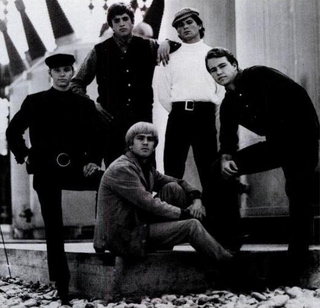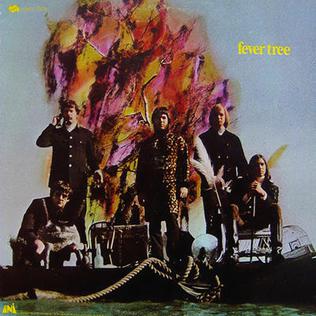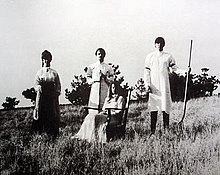
Namu Myōhō Renge Kyō (南無妙法蓮華経) are Japanese words chanted within all forms of Nichiren Buddhism. In English, they mean "Devotion to the Mystic Law of the Lotus Sutra" or "Glory to the Dharma of the Lotus Sutra".

The Electric Prunes are an American psychedelic rock band, formed in Los Angeles, California, in 1965. Much of the band's music was, as music historian Richie Unterberger described it, possessed of "an eerie and sometimes anguished ambiance." It mainly consisted of material by songwriters Annette Tucker and Nancie Mantz, though the group also penned their own songs. Incorporating psychedelia and elements of embryonic electronic rock, the band's sound was marked by innovative recording techniques with fuzz-toned guitars and oscillating sound effects. In addition, guitarist Ken Williams' and singer James Lowe's concept of "free-form garage music" provided the band with a richer sonic palette and exploratory lyrical structure than many of their contemporaries.

The Shadows of Knight is an American rock band from Chicago, Illinois, that plays a version of British blues influenced by their native city. When they began recording in 1965, the band's self-description was "the Stones, Animals and the Yardbirds took the Chicago blues and gave it an English interpretation. We've taken the English version of the Blues and re-added a Chicago touch," to which rock critic Richie Unterberger commented: "The Shadows of Knight's self-description was fairly accurate."

The Music Machine was an American rock band formed in Los Angeles, California in 1966. Fronted by chief songwriter and lead vocalist Sean Bonniwell, the band cultivated a characteristically dark and rebellious image reflected in an untamed musical approach. Sometimes it made use of distorted guitar lines and hallucinogenic organ parts, punctuated by Bonniwell's distinctively throaty vocals. Although they managed to attain national chart success only briefly with two singles, the Music Machine is today considered by many critics to be one of the groundbreaking acts of the 1960s. Their style is now recognized as a pioneering force in proto-punk; yet within a relatively short period of time, they began to employ more complex lyrical and instrumental arrangements that went beyond the typical garage band format.

H. P. Lovecraft was an American psychedelic rock band, formed in Chicago, Illinois, in 1967 and named after the horror writer H. P. Lovecraft. Much of the band's music was possessed of a haunting, eerie ambience, and consisted of material that was inspired by the macabre writings of the author whose name they had adopted. Combining elements of psychedelia and folk rock, the band's sound was marked by the striking vocal harmonies of ex-folk singer George Edwards and the classically trained Dave Michaels. In addition, Michaels' multi-instrumentalist abilities on organ, piano, harpsichord, clarinet and recorder provided the band with a richer sonic palette than many of their contemporaries.

Love, Peace & Poetry – Vol.1 American is the first volume in the Love, Peace & Poetry series released by QDK Media in 1998. This volume explores obscuro garage rock and psychedelic rock bands from America.
Ultimate Spinach was an American psychedelic rock band from Boston, Massachusetts which was formed in 1967. In terms of style and national recognition, the band was one of the most prominent musical acts to emerge from the "Bosstown Sound", which was a marketing campaign posing as a regional attempt to compete with the San Francisco Sound. During the group's existence, they released three albums, with their self-titled debut the most commercially successful.

Volume 3: A Child's Guide to Good and Evil is the fourth album by the American psychedelic rock band The West Coast Pop Art Experimental Band (WCPAEB), and was released on Reprise Records in May 1968. By the time the group commenced recording Volume 3, guitarist Danny Harris had excused himself from the WCPAEB, reducing their numbers to a trio. As with the WCPAEB's earlier work, the album saw the band continue to blend psychedelic influences and complex studio techniques, and was marked by a bizarre fusion of innocence and malice in the band's lyrics. Volume 3 featured the WCPAEB's most ambitious music to date, and the striking cover art of John Van Hamersveld, yet it failed to sell in sufficient copies to chart nationally. In more recent times, the album has been considered the band's most accomplished work and a masterpiece of the psychedelic genre.
Tinkerbells Fairydust were a British pop group in the late 1960s, who hailed from east London. They recorded three singles and one album for the Decca label.
Not to be confused with Styx (band)
Twentieth Century Zoo was an American psychedelic rock band formed from the remnants of The Bittersweets in Phoenix, Arizona in 1967. The band released several singles, and an album to reach regional acclaim before disbanding in 1970. Their later works spanned across multiple genres, including early examples of proto-punk. The band was known for playing among other highly successful acts, and incorporating their influences into the group's own individual sound.

Fever Tree is the debut studio album by the American psychedelic rock band Fever Tree and was released on March 28, 1968 on Uni Records. It blended multiple influences ranging from psychedelia to baroque pop and folk rock, and was marked by eerie ballads and hard rock numbers. Much of the group's material was penned by the husband-wife songwriting duo of Scott and Vivian Holtzman, along with renditions of contemporary rock songs. The album was preceded by arguably Fever Tree's best known song, "San Francisco Girls ", becoming the group's only nationally charting single. Like its attendant single, Fever Tree was also moderately successful and managed to reach number 156 on the Billboard 200.

The Bonniwell Music Machine is the second and final album by the American garage rock band, The Music Machine, recorded under the renamed moniker, The Bonniwell Music Machine, and released on Warner Bros. Records, on February 10, 1968. As with their debut LP, the album again saw the band blending garage and psychedelic rock influences, albeit with a greater emphasis on psychedelia than on their previous album release. Prior to completing its recording, all of the group's original members, except for its creative force, Sean Bonniwell, departed, though they would still appear on some of the album's tracks.
The Magicians were an American garage rock band formed in New York City, New York, in 1965. The group released four singles during their brief recording career with Columbia Records, with their most well-known song being "An Invitation to Cry". Members Alan Gordon and Garry Bonner later became a successful songwriting duo, and the Magicians' material was assembled on a compilation album in 1999.

"Action Woman" is a song by the American garage rock band the Litter, written by their record producer Warren Kendrick, and first released as the group's debut single on Scotty Records in January 1967. The song also appeared on the band's first album Distortions. Although "Action Woman" never broke out on the national charts, it is now revered as a classic piece of the musical genre of garage rock. Accordingly, the composition has appeared on several compilation albums, and has been the subject of cover versions.

The Remains is the debut album by the American garage rock band the Remains, and was released on Epic Records in September 1966. Though the album was largely overlooked at the time of its original release, The Remains has since received recognition as one of the more cohesive efforts of the era.
The Paper Garden was an American psychedelic rock band formed in New York City, New York in 1967. After gathering a sizable following in the Northwest, the group recorded their only album, The Paper Garden, in 1968, which promoted several styles ranging from complex orchestration to hard-edged psychedelia. Following its release, the recordings have since become considered one of the more accomplished artistic statements from the psychedelic era.
"San Francisco Girls " is a song by the American psychedelic rock band Fever Tree, written by the songwriting duo Scott and Vivian Holtzman, and was released for the group's third single—their first on Uni Records—in March 1968. It was the only single by Fever Tree to reach the Billboard Hot 100 and also appears on their first album Fever Tree.

Behold & See is the second album by the American psychedelic rock band Ultimate Spinach, and was released on MGM Records in August 1968.

Distortions is the debut studio album by American psychedelic and garage rock band the Litter. It was released on May 1, 1967, by Warick Records and includes their hit single, "Action Woman.













